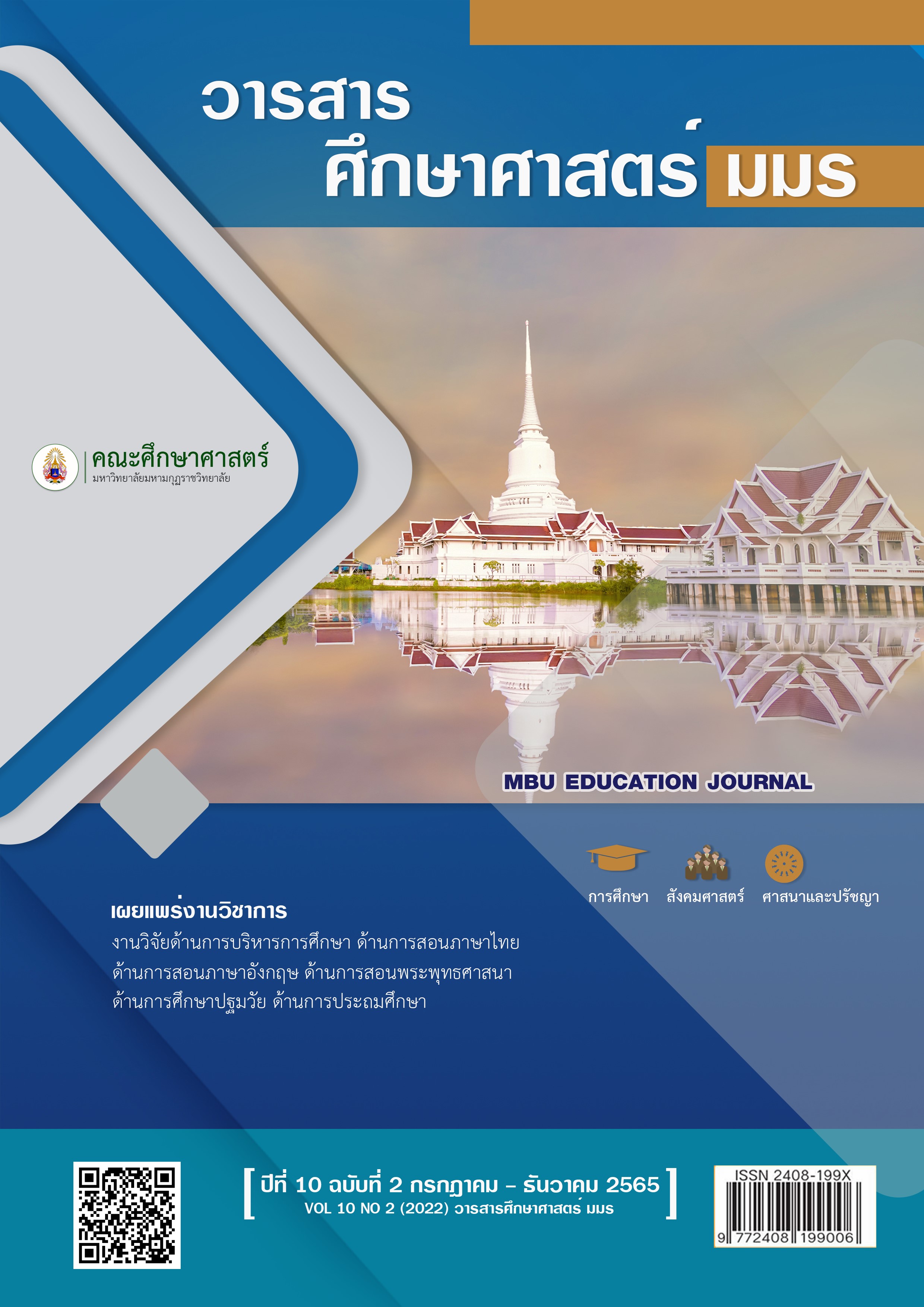การศึกษาและวิเคราะห์แรงจูงใจองค์ประกอบแห่งความสำเร็จของกระบวนการเรียนรู้ โดยใช้ชุมชนการเรียนรู้ทางวิชาชีพสำหรับนักศึกษาประกาศนียบัตรวิชาชีพครู
คำสำคัญ:
ชุมชนการเรียนรู้ทางวิชาชีพ, วิชาชีพครูบทคัดย่อ
การวิจัยครั้งนี้มีวัตถุประสงค์เพื่อ 1) วิเคราะห์องค์ประกอบแห่งความสำเร็จของกระบวนการเรียนรู้โดยใช้ชุมชนการเรียนรู้ทางวิชาชีพ สำหรับนักศึกษาประกาศนียบัตรวิชาชีพครู 2) ศึกษาระดับองค์ประกอบแห่งความสำเร็จของกระบวนการเรียนรู้โดยใช้ชุมชนการเรียนรู้ทางวิชาชีพ สำหรับนักศึกษาประกาศนียบัตรวิชาชีพ และ 3) เปรียบเทียบองค์ประกอบแรงจูงใจองค์ประกอบแห่งความสำเร็จของกระบวนการเรียนรู้โดยใช้ชุมชนการเรียนรู้ทางวิชาชีพสำหรับนักศึกษาประกาศนียบัตรวิชาชีพครู โดยการจำแนกตามเขตพื้นที่ที่ปฏิบัติงาน กลุ่มตัวอย่างที่ใช้ในการวิจัย ได้แก่ นักศึกษาวิชาชีพครูที่ปฏิบัติงานในโรงเรียน สังกัดสำนักงานเขตพื้นที่การศึกษาขั้นพื้นฐาน จำนวน 57 คน เครื่องมือที่ใช้ในการวิจัยครั้งนี้ เป็นแบบสอบถามมาตราส่วนประมาณค่า 5 ระดับ โดยแบบสอบถาม มีค่าความเชื่อมั่นเท่ากับ .80 สถิติที่ใช้ในการวิเคราะห์ข้อมูล ได้แก่ ค่าเฉลี่ยเลขคณิต ส่วนเบี่ยงเบนมาตรฐาน การวิเคราะห์องค์ประกอบเชิงสำรวจ และการเปรียบเทียบค่าเฉลี่ยโดยทดสอบค่าเอฟ ถ้าพบความแตกต่าง ทำการวิเคราะห์ความแตกต่างรายคู่โดยเปรียบเทียบพหุคูณ โดยวิธีของ Scheffe
ผลการวิจัย พบว่า
- องค์ประกอบแห่งความสำเร็จของกระบวนการเรียนรู้โดยใช้ชุมชนการเรียนรู้ทางวิชาชีพ สำหรับนักศึกษาประกาศนียบัตรวิชาชีพครู มี 4 องค์ประกอบ ได้แก่ 1) การเอาใจใส่ในการทำงานเพื่อพัฒนาวิชาชีพ 2) ตระหนักถึงความสำเร็จของนักเรียน 3) มุ่งผลสัมฤทธิ์ทางการเรียน และ 4) มุ่งสนองนโยบายองค์กร
- ครูที่ปฏิบัติงานในโรงเรียน สังกัดสำนักงานเขตพื้นที่การศึกษาขั้นพื้นฐาน มีองค์ประกอบที่แรงจูงใจองค์ประกอบแห่งความสำเร็จของกระบวนการเรียนรู้โดยใช้ชุมชนการเรียนรู้ทางวิชาชีพสำหรับนักศึกษาประกาศนียบัตรวิชาชีพครู โดยภาพรวมอยู่ในระดับมาก
- ครูที่ปฏิบัติงานในโรงเรียน สังกัดสำนักงานเขตพื้นที่การศึกษาขั้นพื้นฐาน ที่ปฏิบัติงานในเขตพื้นที่ต่างกันมีองค์ประกอบแรงแรงจูงใจองค์ประกอบแห่งความสำเร็จของกระบวนการเรียนรู้ทางวิชาชีพครู
โดยภาพรวมแตกต่างกันอย่างมีนัยสำคัญทางสถิติที่ระดับ .01
เอกสารอ้างอิง
วรลักษณ์ ชูกำเนิด เอกรินทร์ สังข์ทอง และชวลิต เกิดทิพย์. (2560) รูปแบบชุมชนการเรียนรู้วิชาชีพ ครูสู่การเรียนรู้ในศตวรรษที่โรงเรียนในประเทศไทยบริบท 21. Hayami Journal 12(2): 123-134.
วิจารณ์ พานิช (2555) วิถีสร้างการเรียนรู้เพื่อศิษย์ในศตวรรษที่ 21. กรุงเทพฯ: มูลนิธิสดศรีสฤษดิ์วงศ์.
สุดเขต เชียวอุไร (2560) แรงจูงใจในการปฏิบัติงานาของข้าราชการครูในสถานศึกษาขั้นพื้นฐานจังหวัดร้อยเอ็ด. (วิทยานิพนธ์ ครุศาสตรมหาบัณฑิต สาขาบริหารการศึกษา มหาวิทยาลัยราชภัฎสุรินทร์, จังหวัดสุรินทร์)
Associates Greenberg, J., Baron, R.A. (1997) Behavior in organizations: Understanding and managing the human side of work. Upper Saddle River, N.J: Prentice Hall.
DuFour, R. (2004) “What is a professional learning community” Educational Leadership. 61(8), 6-11.
Fayol, H. (1916). General and Industrial Management. Institute of Electrical and Electronics.
Hair, J. F. Jr. Black, W. C., Babin, B. J. Anderson, R. E. and Tatham, R. L. (2006). Multivariate data analysis. (6th ed). New Jersey: Prentice Hall.
Hard, C. (1997). A Study of Cooperative Learning as an Organizational Design in the Acquisition of English as a Second Language in a Third Bilingual Classroom. Dissertation Abstracts International. 58(8): 366-A. Retrieved October 11, 2020, from http://search.proquest. com/docview/305215601/abstract/9639140D2B051CCA958/1?accountid=31498.
Herzberg, H. G. (1959). The Motivation to work. New York: John Wiley and Sons.
Senge P. (1990). The fifth discipline: The Art and Practice of the Learning Organization. Century Business. London
Sergiovanni, T. (1994). Building community in schools. San Francisco, CA: Jossey Bass.
Thompson S. C. (2004). Professional learning communities. Leadership, and student learning. Research in Middle Level Education Online, 28(1). Retrieved from http://www.nmsa.org/Publications/RMLEOnline/tabid/101/Default.aspx.
Wiley, S. D. (2001). Contextual effect on student achievement. School leadership and professional community. Journal of Education.
Wood, J. C. & Wood, J. M. (2002). Henri Fayol: Critical Evaluations in Business and Management. New York: Route






